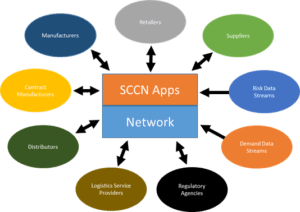 I recently wrapped up my Supply Chain Collaborative Networks (SCCN)market study which looks at the total size of the market, the forecasted growth through 2023, and the leading suppliers across a number of categories including industry, region, and customer size. The study includes a holistic view of the SCCN outlook.
I recently wrapped up my Supply Chain Collaborative Networks (SCCN)market study which looks at the total size of the market, the forecasted growth through 2023, and the leading suppliers across a number of categories including industry, region, and customer size. The study includes a holistic view of the SCCN outlook.
Supply Chain Collaboration Networks are a collaborative solution for supply chain processes. It’s built on a public cloud, a many-to-many architecture, and it supports a community of trading partners or third-party data feeds. As far as defining the market segments, we took a SCOR approach in this market study. So SCOR is plan, source, make, deliver, returns, but we added a couple segments on supply chain risks and supply chain finance. Some of these segments are based on distinct and defined messaging formats. In some cases segments are actual applications, for example, transportation management for the Deliver segment.
I was recently interviewed by ARC Advisory Group’s Chris Cunnane to take a deeper look into the SCCN outlook for the foreseeable future and identify some of the larger trends in the market. The full interview is below.
The SCCN market is growing briskly. There are a number of drivers. But the desire for companies to digitally transform their supply chains is certainly one of the main drivers.
“Digital” is a term that means different things to different people. To some it just means automation, particularly when the automation is based on newer or emerging technologies. In other cases, it means getting digital data, to replace manually entered data, or even worse – no data, in the places in a supply chain where these information black holes exist. And in many companies supply chains, it is the end-to-end portion of the supply chain, knowing what upstream and downstream partners are doing and how well they are doing it, where there are the most black holes. Filling these black holes in the end-to-end supply chain is where SCCN solutions excel. And ARC believes, this end-to-end digitization is a more mature form of a digital transformation than many of the other ways companies think about “digital.”
















